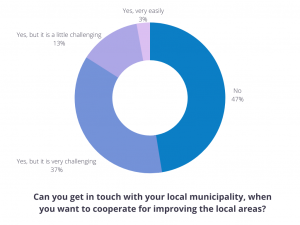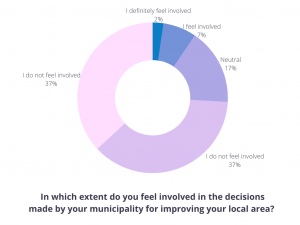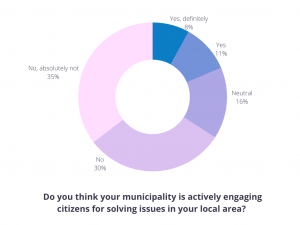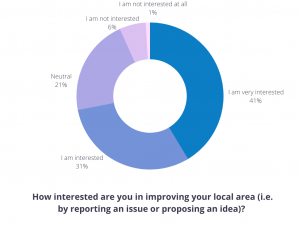Citizen cooperation with local municipalities to improve their neighborhoods
In 2019, WeSolve conducted a survey to examine how Danish citizens interact and communicate with their municipalities to improve the areas they live in. Thereby, attention was paid especially to the reachability of the municipality as well as the inclusion and engagement of citizens living in the respective area. Eventually, we gathered the voices of roughly 2000 people living in Denmark, thereby including a variety of demographic backgrounds in terms of gender, age, occupation, ethnic background as well as the municipality they lived in. Now, simply put, the insights and knowledge we gained were astonishing – in more than one aspect.
Getting in touch with local municipalities
You may be thinking “What could be that surprising when doing a survey on citizen engagement and public participation – if people want to do something or communicate with their local authorities, they can just do that, right?” Well, the short answer is: They cannot.

More than 80% of participants in our survey expressed frustration and dissatisfaction when it comes to reaching out to their municipality. Specifically, 47% of the participants said they could not get in touch with their municipality at all, and 37% answered that getting in contact was a very challenging experience. This result is the starting point for our analysis, because we think it is really standing out.
Citizens’ perception of engagement opportunities
We have also asked the participants to what extent they feel included in decisional and problem-solving processes. By asking the participants if they think their municipality is actively engaging the citizens in such processes, we wanted to dig deeper and gain a more comprehensive understanding of the citizens’ perception of their role in solving local issues. As it is indicated in the graphs below, municipalities currently do not offer proper incentives and opportunities to make citizens feel as part of initiatives to overcome challenges in their area. Let us take a closer look:


First and foremost, almost three quarters of participants answered that they feel rarely or not involved at all when it comes to decisions made by their municipality, opposed to only 9% feeling (very) involved. This strongly connects to the question of the citizens’ anticipation of the efforts taken by the municipality to keep their community engaged. Although this picture looks a bit more optimistic with almost 20% saying their municipality is doing a good job in actively engaging people, 65% of respondents perceive their municipality is putting little to no effort into citizen engagement activities. More precisely, 35% of participants state there is no effort, and 30% indicate only little effort.
When we asked about the obstacles they faced when trying to take action, participants came up with a variety of reasons. The most dominating answer was that they had significant difficulties contacting their local municipality. This refers to all issues connected to the accessibility and reachability of local representatives whether it be through messages sent via mail or social media, attempts to call them or visiting local offices. Furthermore, participants stated that their suggestions were rejected by the municipality or they had difficulties getting support within their local community. Finally, other resources and time are an occurring cause which prevents people from taking action.
Addressing and managing current issues
 Consequently, citizens’ reactions were rather reserved when they were asked about the issue management performance in their municipalities. Although 46% of participants expressed neither high satisfaction nor dissatisfaction towards their municipalities’ issue management, only 29% stated that they are satisfied and 25% even stated that they are not satisfied at all. In that sense, it can be assumed that the bulk of neutral positions represents people struggling to position themselves simply because they actually do not know what their municipality is doing to solve current problems.
Consequently, citizens’ reactions were rather reserved when they were asked about the issue management performance in their municipalities. Although 46% of participants expressed neither high satisfaction nor dissatisfaction towards their municipalities’ issue management, only 29% stated that they are satisfied and 25% even stated that they are not satisfied at all. In that sense, it can be assumed that the bulk of neutral positions represents people struggling to position themselves simply because they actually do not know what their municipality is doing to solve current problems.
These findings seem to be in line with what we have learned so far: citizens feel excluded and unseen when it comes to decisions affecting their neighborhood. Eventually, this can lead to them developing a passive attitude towards their municipality’s processes and improvements. Moreover, this neutrality or passivity towards the municipalities’ activities indicates that officials have some room for improvements when it comes to their strategies to keep citizens informed and engaged.
Citizens’ interest in public participation
 These thoughts lead us to the most interesting result in our study, and probably the one which will cause you to rethink your activities related to civic engagement and public participation. When we asked citizens how interested they are in improving their local area, 31% stated they are interested and even 41% said they are very interested in helping their municipality. This interest in contributing to improving their local area especially revolved around subjects like sustainability, urban spaces and urban décor as well as waste management and community projects. Considering the insights we presented to you before, this appears to be a really large amount of untapped potential. There are more than 70% of participants clearly stating that they want to be involved, yet, somehow this interest seems to not be reflected in reality. It is paradoxical how many citizens want to take part in decision-making and hence, contribute to changing and improving their neighborhood; meanwhile we also know that they feel rather limited and discouraged in their possibilities to do so. You may now think, this is because people are not informed enough or they did not try hard enough. But should volunteering and participating be a hard thing to do – because it should not, right?
These thoughts lead us to the most interesting result in our study, and probably the one which will cause you to rethink your activities related to civic engagement and public participation. When we asked citizens how interested they are in improving their local area, 31% stated they are interested and even 41% said they are very interested in helping their municipality. This interest in contributing to improving their local area especially revolved around subjects like sustainability, urban spaces and urban décor as well as waste management and community projects. Considering the insights we presented to you before, this appears to be a really large amount of untapped potential. There are more than 70% of participants clearly stating that they want to be involved, yet, somehow this interest seems to not be reflected in reality. It is paradoxical how many citizens want to take part in decision-making and hence, contribute to changing and improving their neighborhood; meanwhile we also know that they feel rather limited and discouraged in their possibilities to do so. You may now think, this is because people are not informed enough or they did not try hard enough. But should volunteering and participating be a hard thing to do – because it should not, right?
Citizen engagement as source for sustainable development
We perceive the inner drive of people to be a vital part in shaping the environment they live in; more so, to be the greatest source available. When it comes to improving your municipality, citizens are an amazing force to promote change, since they are the ones living in that area, they know exactly what their community needs to step forward. Based on what we have learned from the participants in our survey, we are convinced that including your citizens in decision-making within the municipality is a necessary step to make the local area a more livable place, which also suits and reflects the diversity of your population. By doing so you can benefit from the input voluntarily presented to you from the people who know best what their neighborhood needs to be a livable and enjoyable place. There are even more benefits included: By talking and listening to your community you can strengthen the bond between you and the people living in the local area; you gain a deeper understanding of the needs and wishes of the citizens and they in turn provide trust and sympathy for the decisions made. Eventually, in the long-run these processes can even help you to reduce costs and save resources since you are able to develop and implement more targeted solutions. The resources which you were able to spare, can be invested into other neighborhood projects and initiatives which further cause your municipality to thrive.
WeSolve offers you the opportunity to bridge the gap between citizens and municipalities; hence simplifying the communication between the local community and respective authorities. You can be better together by solving challenges easier, identifying issues faster and making data-driven decisions more effective.
Do you want to know about our recent 2021 survey, so that you can learn more about citizens opinion and perception of the performance in your municipality in terms of issue management and decision-making? We aim to get a comprehensive overview of the sentiment of people living in Denmark and the areas where they think the municipality can provide more inclusive solutions.
Are you interested to learn more and contribute? Get in touch with us we will be glad having a meeting with you.
If you live in Denmark feel free to download the WeSolve app, follow WeSolve and participate in the 2021 survey about “Decision-making processes in Denmark”: